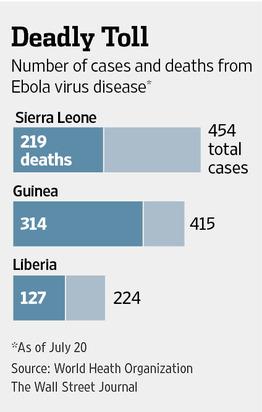| Patrick Sawyer,Liberian- American citizen who died of Ebola in Nigeria |
The Ebola disease is gripping the world in fear! Not only African countries are worried now,but countries outside Africa are beginning to look over their shoulders,this thing could easily blow up by getting spread through international air travel.Nigeria are tightening up their borders as well as other African countries.Especially after the Liberian Patrick Sawyer died in
Nigeria of the Ebola disease.
No one knows for sure just how many people Patrick Sawyer came into contact with the day he boarded a flight in Liberia, had a stopover in Ghana, changed planes in Togo, and then arrived in Nigeria, where authorities say he died days later from Ebola, one of the deadliest diseases known to man. Now health workers are scrambling to trace those who may have been exposed to Sawyer across West Africa, including flight attendants and fellow passengers. Health experts say it is unlikely he could have infected others with the virus that can cause victims to bleed from the eyes, mouth and ears. Still, unsettling questions remain: How could a man whose sister recently died from Ebola manage to board a plane leaving the country? And worse: Could Ebola become the latest disease to be spread by international air travel? Sawyer's death on Friday has led to tighter screening of airline passengers in West Africa, where an unprecedented outbreak that emerged in March has killed more than 670 people in Guinea, Sierra Leone and Liberia. But some health authorities expressed little confidence in such precautions.
| Infected American doctor Dr Kent Brantly, pictured with his wife and children . |
The risk of travelers contracting Ebola is considered low because it requires direct contact with bodily fluids or secretions such as urine, blood, sweat or saliva, experts say. Ebola can't be spread like flu through casual contact or breathing in the same air. Patients are contagious only once the disease has progressed to the point they show symptoms, according to the WHO. And the most vulnerable are health care workers and relatives who come in much closer contact with the sick. Still, witnesses say Sawyer, a 40-year-old Liberian Finance Ministry employee en route to a conference in Nigeria, was vomiting and had diarrhea aboard at least one of his flights with some 50 other passengers aboard. Ebola can be contracted from traces of feces or vomit, experts say.
 |
| Ebola disease deadly toll |
Sawyer was immediately quarantined upon arrival in Lagos — a city of 21 million people — and Nigerian authorities say his fellow travelers were advised of Ebola's symptoms and then were allowed to leave. The incubation period can be as long as 21 days, meaning anyone infected may not fall ill for several weeks. Health officials rely on "contact tracing" — locating anyone who may have been exposed, and then anyone who may have come into contact with that person. That may prove impossible, given that other passengers journeyed on to dozens of other cities. Patrick Sawyer had planned to visit his family in Minnesota next month to attend two of his three daughters' birthdays, his wife, Decontee Sawyer, told KSTP-TV in Minnesota. "It's a global problem because Patrick could have easily come home with Ebola, easy," she said. The Associated Press left phone and email messages for her Monday.
International travel has made the spread of disease via airplanes almost routine. Outbreaks of measles, polio and cholera have been traced back to countries thousands of miles away. Even Ebola previously traveled the globe this way: During an outbreak in Ivory Coast in the 1990s, the virus infected a veterinarian who traveled to Switzerland, where the disease was snuffed out upon arrival and she ultimately survived, experts say. Two American aid workers in Liberia have tested positive for the virus and are being treated there. U.S. health officials said Monday that the risk of the deadly germ spreading to the United States is remote. The mere prospect of Ebola in Africa's most populous nation has Nigerians on edge. In Nigeria's capital, Abuja, Alex Akinwale, a 35-year-old entrepreneur, said he is particularly concerned about taking the bus, which is the only affordable way to travel. "It's actually making me very nervous. If I had my own car, I would be safer," he said. "The doctors are on strike, and that means they are not prepared for it. For now I'm trying to be very careful."
It's an unprecedented public health scenario: Since 1976, when the virus was first discovered, Ebola outbreaks were limited to remote corners of Congo and Uganda, far from urban centers, and stayed within the borders of a single country. This time, cases first emerged in Guinea, and before long hundreds of others were stricken in Liberia and Sierra Leone. Those are some of the poorest countries in the world, with few doctors and nurses to treat sick patients let alone determine who is well enough to travel. In Sawyer's case, it appears nothing was done to question him until he fell sick on his second flight with Asky Airlines. An airline spokesman would not comment on what precautions were being taken in the aftermath of Sawyer's journey. Liberian Assistant Health Minister Tolbert Nyenswah told The Associated Press last week that there had been no screening at Liberia's Monrovia airport. That changed quickly over the weekend, when President Ellen Johnson Sirleaf said a new policy on inspecting and testing all outgoing and incoming passengers will be strictly observed. She also announced that some borders were being closed and communities with large numbers of Ebola cases would be quarantined.
| Dr. Kent Brantly of Samaritan's Purse relief organization is shown wearing protective clothing as he works with Ebola patients in Liberia. Brantly is also being treated after somehow becoming infected with the virus. While the protective suits keep infectious fluids out, relief workers do often become victims |
